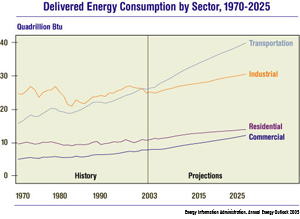
Key Issues & Mandates
Secure & Reliable Energy Supplies
 Throughout the 20th century, our Nation's extraordinary development was fueled, in large part, by fossil energy. Looking toward the future, Americans are asking fundamental questions about how to best ensure secure, reliable, and affordable energy supplies for the coming decades. Throughout the 20th century, our Nation's extraordinary development was fueled, in large part, by fossil energy. Looking toward the future, Americans are asking fundamental questions about how to best ensure secure, reliable, and affordable energy supplies for the coming decades.
Despite gains in energy efficiency, the United States will require more energy in the next 20 years to fuel a growing economy. It is expected that fossil energy will fill a large portion of this growing need over this timeframe. For fossil energy to fulfill its role in the Nation's energy mix, several questions must be addressed:
- How much of our fossil energy will come from domestic rather than imported sources?
- Can we realize the benefits of fossil energy while meeting environmental goals and controlling global climate change?
- Can our energy infrastructure reliably deliver energy to the marketplace in the future?
These overriding concerns have been at the heart of national energy policy initiatives. Through the Energy Policy Act of 2005, Congress enacted measures to ensure a secure energy future for our Nation. The bill makes a commitment to energy efficiency and renewable energy, and promotes cleaner and more productive use of domestic energy resources, including coal, nuclear power, and oil and natural gas.
| |
CLICK ON GRAPHICS TO ENLARGE |
| |
|
|
|
|
| |
  Total primary energy consumption in the United States is projected to increase from 99.7 quadrillion Btu in 2004 to 133.9 quadrillion Btu in 2030 (an average annual increase of 1.1 percent). |
|
|
|
| |
|
| |
|
| |
|
| |
|
The bill specifically recognizes:
- The importance of coal as America's most abundant energy resource and as the source of more than half of our electricity production.
- The imperative of expanding domestic production of oil and natural gas.
- The promise of hydrogen and fuel cell technology.
- The need to ensure reliable delivery of natural gas by encouraging construction of new pipelines, storage facilities, and receiving terminals for liquefied natural gas.
- The importance of a modern 21st century electricity grid for delivery of reliable, high-quality electricity.
The United States is not the only large consumer of fossil fuels. Indeed, energy demand growth in developing economies such as China and India is significantly outpacing U.S. demand. The result is already visible in rising global competition for energy resources. To encourage cleaner, more efficient production and use of fossil energy, the United States has joined with India, China, Australia, Japan, and South Korea to create a new Asia Pacific Partnership on Clean Development. This innovative program is authorized by the Energy Policy Act of 2005.
Energy Security Studies and Legislative Proposals
Recent focus on U.S. energy price, availability, and security has resulted in publication of a number of studies and proposals for legislative action. Click here to read more about this issue.
NETL's Contributions
Through DOE's Office of Fossil Energy, NETL supports a range of R&D partnerships to keep domestic resources a viable part of our Nation's energy portfolio, and to ensure that these resources are used cleanly and efficiently. Key areas of focus are technologies that will enable:
- Full realization of the clean-energy potential of our abundant domestic coal supplies. America's recoverable coal has an energy content roughly comparable to all the world's known oil reserves. This abundant resource supplies more than half the U.S. electric power supply, and it may also contribute to the Nation's transition to a hydrogen economy. With clean coal technologies, our Nation has the potential to dramatically improve the performance of today's power plants, and to develop a virtually pollution-free coal plant in time for
the
next wave of power plant construction.
- Cost-effective, environmentally sound exploration and production of domestic oil and natural gas. Domestic natural gas and oil resources remain plentiful. Yet resources that can be found and recovered with conventional methods are dwindling. With a new generation of exploration, drilling, and recovery technologies, these domestic resources can remain a significant part of our Nation's energy portfolio. Advanced technologies are key to cost-competitive recovery of remaining resources and to meeting environmental protection goals.
Federal investments to meet fossil energy challenges will return economic and energy-security benefits for decades to come, enabling domestic fuels to economically power America's homes, industries, businesses, and transportation, while also maintaining the quality of our environment.
1 Coal – A Secure U.S. Energy Source, National Coal Council
|